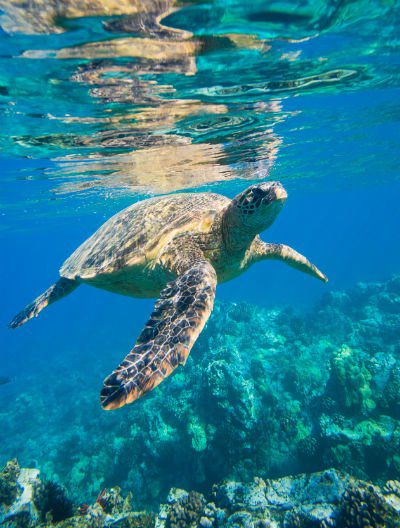World Oceans Day takes place annually on the 8th June and aims to raise awareness about the issues our beautiful oceans face whilst also celebrating the significant role it plays in our lives. World Oceans Day is the perfect day to consider what steps individuals or organisations can take to protect our precious oceans for future generations.
Table of Contents
Why Conserve the Ocean?
Our big blue oceans cover almost 70% of the Earth [1] whilst also connecting people from across the world. But without healthy oceans we face a myriad of problems in relation to climate change and global warming. Some of the other reasons why it’s more important than ever to conserve our oceans include [2]:
- Many people believe that rainforests produce most of the world’s oxygen however it is actually the ocean that generates the most (70%). Without healthy oceans, humans and animals would struggle to stay alive.
- The ocean provides vast amounts of food including fish, seafood and seaweed. With a growing worldwide population, we rely on the oceans for sources of nutritious food.
- The ocean is home to nearly 300,000 types of marine creatures and a further 2 million creatures that are not fully identified or known. From dolphins to whales to seahorses, these creatures rely on healthy oceans to avoid extinction.
- The development of pharmaceutical medicines – did you know that many drugs including a drug to fight cancer originated from the sea?
These reasons are enough that we should care about the future of our oceans and the real question should be why wouldn’t you fight to protect them?
Current Threats to Ocean Health
Many of the stresses that are put on our oceans are caused by human and land activity meaning actions can be taken to address the issues.
Overfishing, factory and industrial practices that lead to chemical and oil pollution and global warming that causes coral bleaching and dying coral reefs are just some of the major threats to ocean health [3].
However, the biggest threat our oceans face is plastic pollution.
It’s quite shocking to think that over 100,000 marine creatures and a further 1 million sea birds die annually from entanglement in plastic [4]. This is reportedly caused by 15,000 pieces of plastic being dumped in our oceans worldwide daily. It’s also believed that there is as much as 5 trillion pieces of plastic debris lying on and under the surface of the ocean. Plastic pollution is a major problem that affects the health of our ocean, human health and the creatures who call it their home. Amongst the vast amounts of plastic pollution are discarded fishing nets and single use plastic bags and bottles.
Citron Hygiene’s Commitment to Preventing Plastic Pollution
Citron Hygiene understand that our oceans should not be taken for granted which is why we have taken steps to develop innovative, eco-friendly solutions that tackle plastic pollution and help minimise businesses environmental impact.
ECONYL® for Floorcare
Plastic fishing nets that account for 10% of all marine litter [5] are a big problem as marine wildlife can become accidentally entangled which can then unfortunately result in death.
In order to reduce the staggering number of fishing nets that are left in our oceans, we work closely with our suppliers and all floormats are made with ECONYL®. Although similar in quality to nylon yarn that is used in most mats, Econyl® yarn is made from 100% regenerated waste materials that include industrial plastic waste, discarded yarn and fishing nets meaning that it is extremely environmentally friendly.
Not only this but all our end-of-life mats are 100% recycled to ensure environmental impact is further minimised. By choosing floorcare solutions from Citron Hygiene, your business will be taking vital steps to conserve our precious oceans whilst meeting its corporate social responsibilities.
Washroom Products Recycling
To further divert plastic and other materials away from landfill and oceans, Citron Hygiene recycle 90% of plastic, cardboard and tins from our operational sites. All washroom and hygiene products that are returned to us are also recycled.
Use of Biodegradable Plastics in Water Management Solutions
Compared to natural plastics, biodegradable plastics are much kinder to the environment as they decompose naturally and do not release carbon that can be a harmful pollutant when melted.[6]
Our leading Actiflow water saving system is made from 100% biodegradable plastic and is the perfect solution for businesses who are looking to make water and cost savings and be more eco-friendly.
The system works by killing bacteria and ammonia that causes bad odours in urinals that significantly reduces the need for constant flushing and therefore reducing water waste from flushing.
Support World Oceans Day
There are many actions that businesses and individuals can take to help protect our oceans for the future.
On World Oceans Day, why not take the opportunity to change perspective and consider how your business can make small changes to conserve our big ocean?
Get in touch with Citron Hygiene to find out about our ocean-friendly washroom services and floormats.
